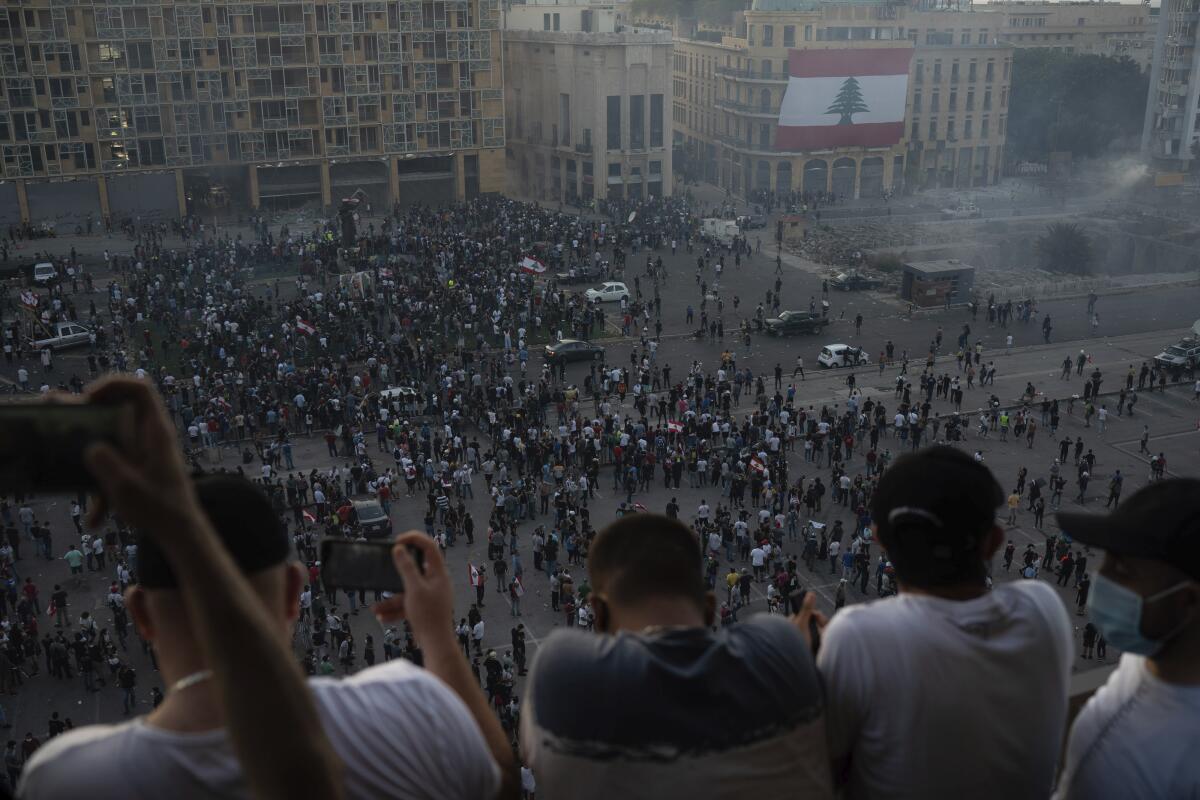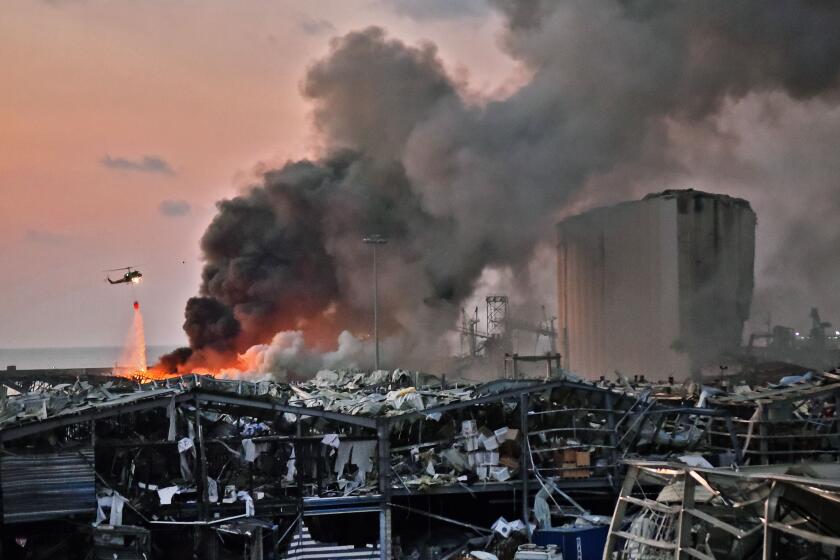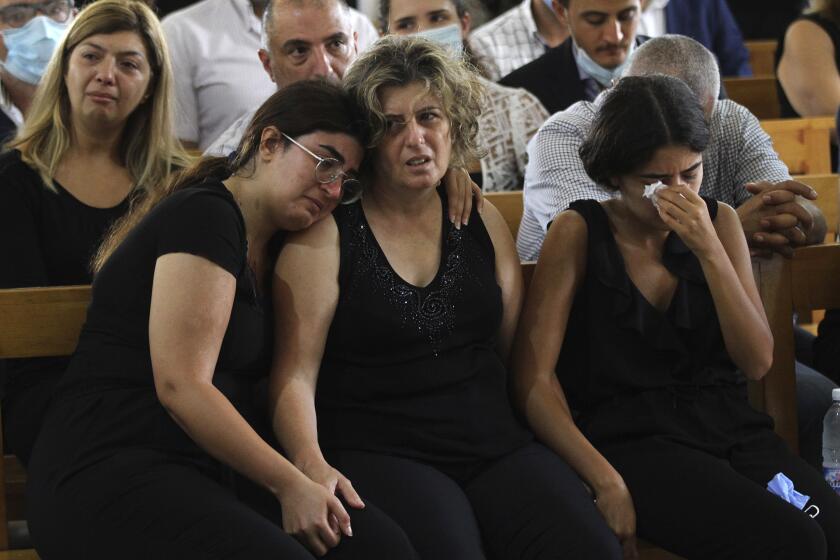Tear gas and clashes in Beirut amid fury over massive explosion

- Share via
BEIRUT — Demonstrators stormed government buildings, lighting fires and fighting pitched street battles with security forces in the Lebanese capital on Saturday, even as the country’s embattled prime minister called for early parliamentary elections.
The protests, which drew thousands to Beirut’s downtown district, come days after a massive explosion leveled wide swaths of the city’s waterfront district, killing at least 150 people and wounding 5,000 more. Many blame the incident on negligence by the country’s ruling politicians in allowing the ongoing storage of explosives at the city’s port.
“I’m here today because we have nothing to lose. We’re here for this government to fall, all of it. They’re supposed to protect us and help us? They have no honor,” said May Dabbous, a mother of four children — all of whom were participating in the protests — as she watched from a building in Beirut’s downtown district.
“I don’t want them to leave” the protests, she said. “They have to stay here until those politicians leave.”
Nearby, activists marched with mock gallows — a symbol for the #String_Up_The_Gallows campaign that saw enraged Beirutis call for the hanging of leading politicians for what the protesters see as the state corruption that resulted in Tuesday’s blast. Behind them, a banner strung on a billboard read, “Justice to the victims. Revenge from the regime.”
The explosion resulted from the ignition of 2,750 tons of ammonium nitrate — a chemical compound used both as a fertilizer and as an explosive — that had been stored in Beirut’s port for more than six years, despite repeated requests by customs officials for it to be removed. A fire on Tuesday in an adjacent warehouse soon spread to the cache of ammonium nitrate. The resulting blast was felt as far off as Cyprus, more than 100 miles away. In addition to those that were flattened, thousands of buildings in Beirut’s eastern district are now all but uninhabitable, with hundreds of thousands left homeless.
Los Angeles Times reporter Nabih Bulos was less than 500 yards from the center of the massive explosion in Beirut. He lived to tell the tale
For many on the streets on Saturday, it was the last straw.
“I have no home. I have no job. I have nothing to eat. They want to shoot me? Let them,” said Ghada Mohsen, a 30-year-old woman wearing a Lebanese flag as a cape as she stamped on a picture of President Michel Aoun.
Down the street, demonstrators ripped up pavement to lob at riot-ready security forces, who shot volleys of tear gas and incendiary devices as well as what activists said were rounds of gunfire. Lebanon’s internal security force announced on Twitter that one of its personnel died after “trouble-making killers” attacked him in a hotel downtown.
Meanwhile, bands of protesters broke into government buildings, including those of the Foreign Ministry and the Ministry of Economy and Trade. Some set fires in offices, while others tossed reams of paper out of windows as crowds below cheered.
As the violence raged downtown, Prime Minister Hassan Diab delivered a speech in which he said he was committed to a transparent investigation of the explosion.
“I promised the Lebanese that I wouldn’t accept this disaster to pass without accountability for those responsible for it,” he said. “Today I want to confirm ... all those responsible for this disaster should submit to an investigation.”
He also called for early elections.
“We knew the country is in a state of political, administrative and financial collapse,” Diab said. “But realistically, we can’t get out of the country’s structural crisis except by running early parliamentary elections to create a new political class and a new parliament.”
Through tears in Beirut, Lebanese survivors share stories of missing loved ones
A number of members of parliament resigned earlier in the day, though not enough to lead to the body’s dissolution.
Lebanon’s barely functional government is set up on a system apportioning power among the country’s 18 fractious sects. Many of the sect leaders rose to power as warlords during the country’s brutal civil war, which ended in 1990 and devastated much of the country. They have since wielded their influence to create patronage networks for their constituents, while failing to carry out the most basic of services, such as 24-hour electricity or trash collection.
The shortcomings came into sharp focus last year, when an increasingly dire financial situation for the country led to a run on the Lebanese lira, the official currency. The situation spurred widespread protests that drew more than a fifth of the country’s 5.4 million citizens to the street demanding reforms.
Though a new government was formed, the situation only became worse: Since October, the lira has lost more than 70% of its value to the dollar — a disaster for a country that imports 80% of its goods. Unemployment has also soared, even as coronavirus lockdowns have played havoc with the already battered economy and taken the country’s health system to the brink. (On Saturday, Lebanon’s COVID-19 case tally was 6,223 and death toll 78, according to health data published by Johns Hopkins University.)
The Islamic Medical Assn., a Lebanese charity, said it treated more than 200 protesters Saturday for injuries sustained in clashes with security forces.
More to Read
Sign up for Essential California
The most important California stories and recommendations in your inbox every morning.
You may occasionally receive promotional content from the Los Angeles Times.













